#Buendía Family
Explore tagged Tumblr posts
Text
Round One
Big Mom Family (One Piece) VS the Buendía Family (One Hundred Years of Solitude)

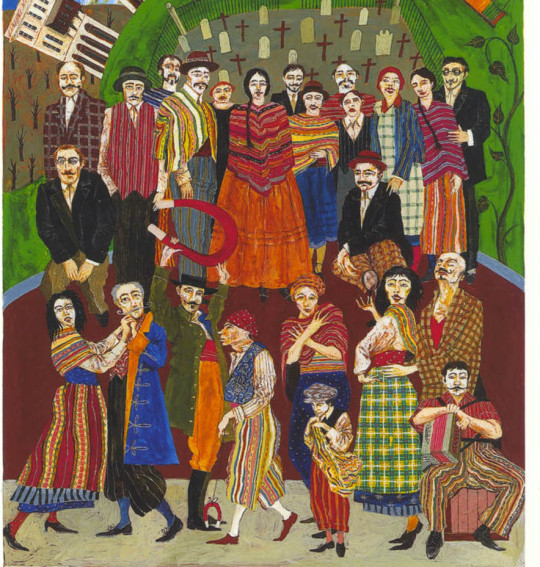
Buendía Family art from Folio Society, by Neil Packer
Big Mom Family
Members: Linlin “Big Mom” Charlotte, Katakuri, Pound, Cracker, Big Mom's 82 other children, and her 43 husbands
Propaganda:
"They are a giant family that is also a pirate group. Everyone is married and born to fulfill Big Mom’s desire to have a family. Basically all of them hate each other." "Big Mom...so first let me note that this woman marries a man for her poliical convenience, gets pregnant, then divorces him as soon as she has his kids. She maintains complete control over the destiny of her children. They will join her pirate crew, they will fight for her, they will marry as she asks, they will grow up to serve her. They won't know their dad, or anything else, and she will even kill them when she doesn't get like a food she asks for, for instance." note: edited for length, full submission here
The Buendía Family
Members: Úrsula, José Arcadio, Colonel Aureliano, Amaranta, Rebeca, Remedios, another Jose Arcadio, Arcadio, 17 Aurelianos, Aureliano José, Aureliano Segundo, José Arcadio Segundo, Fernanda, Remedios the Beauty, Meme, another José Arcadio, another Aureliano, Úrsula Amaranta
Propaganda:
CW: Pedophilia, murder, self-harm, suicide, rape, incest
"Well, the original patriarch José Arcadio bankrupted everyone with his get-rich-quick schemes and went insane, their child Aureliano was obsessed with and married a child, his sister Amaranta considered killing her sister Rebeca over her getting married to the man she was also in love with until Rebeca fell in love with her adopted brother José Arcadio instead, which their mother drove them out for. Then José Arcadio got mysteriously murdered. Amaranta felt so guilty about wanting some delay to the wedding so she wouldn't "have" to kill Rebeca that she refused the man they were in love with when she finally had the chance and drove him to suicide, which she felt so guilty about that she horribly burned her own hands. Then she borderline molested her nephew Aureliano José when he was a child (she never went as far as actual sexual acts but spent a lot of time with them both naked, leading to Aureliano José developing an obsession with her when he grew up). Also José Arcadio (the adopted brother who married Rebeca) had a child at 14, and said child Arcadio unknowingly tried to sleep with his mother Pilar Ternera. Aureliano Segundo, Arcadio's son, married Fernanda and they had a miserable marriage, and when their daughter Meme fell in love she had his lover shot and he got paralyzed, then sent Meme to be a nun where she never spoke again and locked their child Aureliano in a room for his childhood. Aureliano then tried to rape Ursula Amaranta, who was actually his aunt but he didn't know, but she decided she liked him more than her husband and had sex with him willingly, until she died in childbirth and their child got eaten by ants. Yeah it's a weird book." note: edited for length, full submission here
#polls#big mom family#buendía family#one piece#one hundred years of solitude#cien años de soledad#round one
43 notes
·
View notes
Text
Writing Prompt: The First Lines
Choose one of the first lines of these literary works and either create a new poem/story, or continue rewriting the story...
Happy families are all alike; every unhappy family is unhappy in its own way. —Leo Tolstoy, Anna Karenina (1873)
If you really want to hear about it, the first thing you’ll probably want to know is where I was born, and what my lousy childhood was like, and how my parents were occupied and all before they had me, and all that David Copperfield kind of crap, but I don’t feel like going into it, if you want to know the truth. —J. D. Salinger, The Catcher in the Rye (1951)
In my younger and more vulnerable years, my father gave me some advice that I've been turning over in my mind ever since. —F. Scott Fitzgerald, The Great Gatsby (1925)
It was a bright cold day in April, and the clocks were striking thirteen. —George Orwell, Nineteen Eighty-Four (1949)
It was a pleasure to burn. —Ray Bradbury, Fahrenheit 451 (1953)
It was a queer, sultry summer, the summer they [electrocuted the Rosenbergs], and I didn’t know what I was doing in New York. —Sylvia Plath, The Bell Jar (1963)
I was born twice: first, as a baby girl, on a remarkably smogless [Detroit day of January 1960]; and then again, as a teenage boy, in an emergency room near [Petoskey, Michigan, in August of 1974.] —Jeffrey Eugenides, Middlesex (2002)
Mama died today. Or yesterday maybe, I don’t know. —Albert Camus, The Stranger (1942)
Many years later, as he faced the firing squad, [Colonel Aureliano Buendía] was to remember that distant afternoon when his father took him to discover ice. —Gabriel García Márquez, 100 Years of Solitude (1967)
"Where's Papa going with that ax?" —E. B. White, Charlotte's Web (1952)
If this writing prompt inspires you in any way, please tag me, or send me a link. I would love to read your work!
More: The Last Lines (pt. 1) ⚜ (pt. 2) More: Writing Prompts
#writing prompt#writing inspiration#writing exercise#spilled ink#dark academia#poetry#literature#writeblr#writers on tumblr#poets on tumblr#creative writing#writing prompts#light academia#quotes#lit#booklr#books#bookblr#writing reference#writing ideas#writing inspo#writing resources#leo tolstoy#jd salinger#f scott fitzgerald#george orwell#ray bradbury#sylvia plath#jeffrey eugenides#albert camus
238 notes
·
View notes
Text



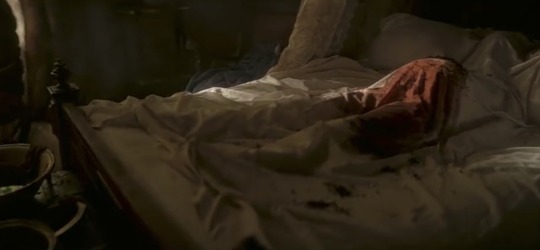


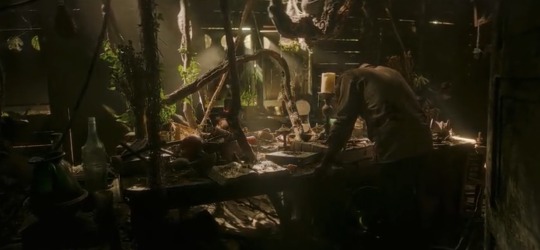

One Hundred Years of Solitude by Gabriel Garcia Marquez
The Last Chapter
Amaranta Úrsula’s shrieks, her songs of agony would break out the same at two in the afternoon on the dining-room table as at two in the morning in the pantry. “What hurts me most,” she would say, laughing, “is all the time that we wasted.” In the bewilderment of passion she watched the ants devastating the garden, sating their prehistoric hunger with the beam of the house, and she watched the torrents of living lava take over the porch again, but she bothered to fight them only when she found them in her bedroom. Aureliano abandoned the parchments, did not leave the house again, and carelessly answered the letters from the wise Catalonian. They lost their sense of reality, the notion of time, the rhythm of daily habits. They closed the doors and windows again so as not to waste time getting undressed and they walked about the house as Remedios the Beauty had wanted to do and they would roll around naked in the mud of the courtyard, and one afternoon they almost drowned as they made love in the cistern. In a short time they did more damage than the red ants: they destroyed the furniture in the parlor, in their madness they tore to shreds the hammock that had resisted the sad bivouac loves of Colonel Aureliano Buendía and they disemboweled the mattresses and emptied them on the floor as they suffocated in storms of cotton. xxx xxx
After cutting the umbilical cord, the midwife began to use a cloth to take off the blue grease that covered his body as Aureliano held up a lamp. Only when they turned him on his stomach did they see that he had something more than other men, and they leaned over to examine him. It was the tail of a pig.
They were not alarmed. Aureliano and Amaranta Úrsula were not aware of the family precedent, nor did they remember Úrsula’s frightening admonitions, and the midwife pacified them with the idea that the tail could be cut off when the child got his second teeth. Then they had no time to think about it again, because Amaranta Úrsula was bleeding in an uncontainable torrent. xxx xxx
He could not find the basket. At first he felt an outburst of joy, thinking that Amaranta Úrsula had awakened from death to take care of the child. But her corpse was a pile of stones under the blanket. Aware that when he arrived he had found the door to the bedroom open, Aureliano went across the porch which was saturated with the morning sighs of oregano and looked into the dining room, where the remnants of the birth still lay: the large pot, the bloody sheets, the jars of ashes, and the twisted umbilical cord of the child on an opened diaper on the table next to the shears and the fishline. xxx xxx
Aureliano could not move. Not because he was paralyzed by horror but because at that prodigious instant Melquíades’ final keys were revealed to him and he saw the epigraph of the parchments perfectly placed in the order of man’s time and space: The first of the line is tied to a tree and the last is being eaten by the ants. xxx xxx
Only then did he discover that Amaranta Úrsula was not his sister but his aunt, and that Sir Francis Drake had attacked Riohacha only so that they could seek each other through the most intricate labyrinths of blood until they would engender the mythological animal that was to bring the line to an end. xxx xxx
Before reaching the final line, however, he had already understood that he would never leave that room, for it was foreseen that the city of mirrors (or mirages) would be wiped out by the wind and exiled from the memory of men at the precise moment when Aureliano Babilonia would finish deciphering the parchments, and that everything written on them was unrepeatable since time immemorial and forever more, because races condemned to one hundred years of solitude did not have a second opportunity on earth.
#this is literally the first scene on netflix#100 years of solitude#one hundred years of solitude#gabriel garcia marquez#100 years of solitude netflix#latin american history#THE MAGIC OF GABRIEL GARCIA MARQUEZ
29 notes
·
View notes
Text
One Hundred Years of Solitude in Canto VII
This is an analysis on how Don's canto, Canto VII, might have taken inspirations from another iconic book. If you haven't done all parts already, please do it first before reading because there are some spoilers under the cut.
I've also posted the same text on Reddit, if you see this analysis there, it's mine :)
As I was finishing Canto VII narrative, I noticed there were some similarities between the story seen from La Manchaland with another book: One Hundred Years of Solitude, written by the Colombian author Gabriel Garcia Marqués.
If you guys haven't read it, The book is about the creation of a city called Macondo, and how it's founder's family — the Buendía family — is stuck in a perpetual cycle of misery for generations until the city itself colapses into ruins.
Going into details, what drawn me to create this post is how similar Don Quixote (the original) is to José Arcadio Buendía, the founder of Macondo.
In the beginning of the book, he decided to leave his hometown with his wife due to conflict between them and the people living there, and spend some time with no place for themselves. One day, while camping near a riverbank, José Arcadio dreams of "Macondo", an utopic city that reflected the world and upon awakening, he decides to build what he had seen on his dreams, and establish Macondo there near the rivers.
The city was pretty isolated, and only had some contact with outside worlds once a year, when a band of gypsies visits the town show the townspeople scientific discoveries such as magnet. José Arcadio soon becomes obsessed with all the inventions outsiders showed to him and it concerned his family so much to the point of deciding to tie him to a chestnut tree for many years until his inevitable death.
From the dream of creating a city designed to give happiness to his family, to their destined ending, both character seems to have a lot in common. We can even check out the location of La Manchaland having rivers just like Macondo city.
There might be much more, such as the massacre that happened when a village was built near the city in the book being some sort of parallel to the incident that happened in La Manchaland. But I need to reread the book to get the details straight.
But it's interesting to have this book as second source of material for inspiration, since it's main theme is the inescapable repetition of history. Just like a merry-go-round both Macondo city and Sancho has been stuck in a loop and they needed a cataclyst to finally bring this horrible cycle to end.
38 notes
·
View notes
Text
adult men writing that remedios the beauty is an example of the egocentrism of the buendía family bc she thought the men perishing over her were silly and simple... turn on your location. I just want to talk 🙃
35 notes
·
View notes
Text
if you're tired of waiting for grrm to drop winds of winter and having been disappointed by the on screen adaptation, you may look no further than A Hundred Years of Solititude by Gabriel Garcia Marques.
a beautifully written story of the incestual and dysfunctional Buendía Family in the town of Macondo, Colombia (of which you can watch a very meticulous adaptation of it in Netflix if you don't wish to read the novel or as you read the book like i did) spanning the titular 100 years filled with unexplained yet somehow deemed normal magic, politics, drama and taboo relationships
what it lacks in gays it makes up in being set in Colombia, made by Colombians and starred by Colombians with indigenous peoples and non eurocentric beauty standards
11 notes
·
View notes
Text
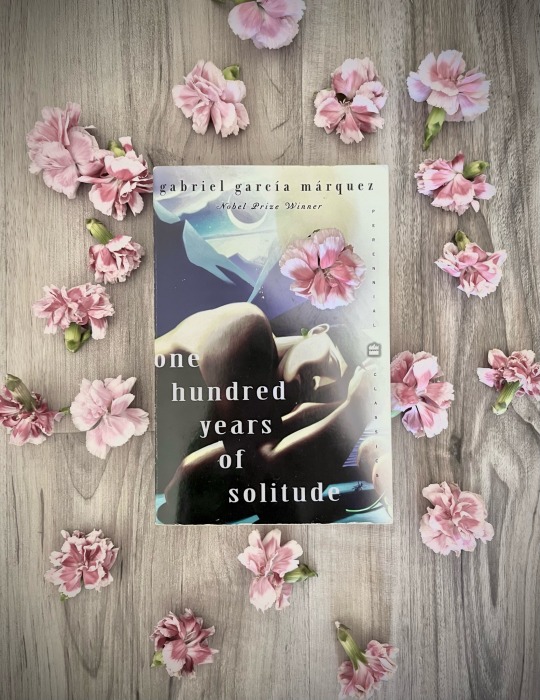
One Hundred Years of Solitude by Gabriel García Márquez
Plagues of memory, levitating priests, and flowers falling from the sky seem far from mundane, yet the most magical thing about this book is the author’s ability to make a small Colombian town so rich and colorful that real life pales in comparison. Both romantic and bitingly political, the multi-generational story of the Buendía family transcends the limits of language and time. The same names may be used a little too often for my feeble brain to remember, but the moments of both triumph and suffering, love and revenge, despair and, above all else, hope, make Márquez’s world one I will not soon be able to forget.
#mine#book review#100years#gabriel garcia marquez#100 years#100 years of solitude#classic literature#literature#reading#read#book#academia#light academia#cottagecore#one hundred years of solitude
20 notes
·
View notes
Text
The non english version based on the notes of the other poll (translations are not mine. Apologies for any inaccuracies)
Update: I realize after i made it i put the same Don Quixote quote twice but i cant edit polls so 4 and 9 are the same. oops
update 2: I accidentally put the first line of ch 1 instead of the first line of the prologue for Posthumous Memoirs. the correct quote is "Ao verme que primeiro roeu as frias carnes do meu cadáver dedico como saudosa lembrança estas memórias póstumas".
Translations and sources:
– Iliade by Homer. (“Sing, goddess, of the anger of Achilles, son of Peleus”)
Anna Karenina by Lev Tolstoy ("All happy families resemble one another; every unhappy family is unhappy in its own way.")
One Hundred Years of Solitude by Gabriel García Márquez. ("Many years later, as he faced the firing squad, Colonel Aureliano Buendía was to remember that distant afternoon when his father took him to discover ice.")
Cervantes from Somewhere in La Mancha by Don Quixote, (“In a place whose name I do not care to remember")
The Aeneid. ("I sing of arms and men")
The Metamorphosis by Kafka ("As Gregor Samsa awoke one morning from uneasy dreams he found himself transformed in his bed into a gigantic insect.")
the Inferno by Dante ("When halfway through the journey of our life")
The Stranger by Albert Camus. (Mother died today. Or, maybe, yesterday; I can’t be sure”.)
Miguel de Cervantes by Don Quixote (“Somewhere in la Mancha, in a place whose name I do not care to remember, a gentleman lived not long ago, one of those who has a lance and ancient shield on a shelf and keeps a skinny nag and a greyhound for racing.”)
the Posthumous Memoirs of Brás Cubas by Machado de Assis ("to the worm who first gnawed on the cold flesh of my corpse, I dedicate with fond remembrance these Posthumous Memoirs")
77 notes
·
View notes
Note
Hii love your translation to pieces! How have you been? Have you been reading/watching any other media (aside from TYK) recently that u would rec?
Hello! Thank you so much for your message! I'm kind of in the mud trenches rn but I am very happy to be remembered ❤️❤️❤️
I am going to ramble a lot so sorry about that and thanks for giving me permission to do so.
I would have a hard time putting together "recs for someone who enjoyed TYK", because I think it's an unusual type of story. It's about a protagonist who's so tired of being a main character (or even a secondary character). All he wants is to be a side character who enjoys himself and isn't important enough to get hit by plot shrapnel. I remember @specialability making the astute observation that TYK has a lot in common with Rosencrantz and Guildenstern are Dead. What do side characters do, when the main characters aren't on stage? But TYK emanates joy that you don't find in the other existentialist stories I've read (which may say more about my own deficiency than the genre itself). Zhou Zishu is dying, but he finds a lot of happiness in spending every day exactly as he wants to. Taking care of Zhang Chengling, untangling the Glazed Spiral mystery, and messing around with Wen Kexing: this is all meaningful to him because it's how he wants to spend the rest of his life. However short that life may be.
That being said, since you gave me permission, I'm going to talk about what I've read recently!
One Hundred Years of Solitude (Gabriel Garcìa Márquez) left a really strong impression on me. I guess because the characters in the Buendía family (the novel tells this family's story) trap themselves into lives that they don't enjoy at all. Some of them live for a hundred years or more, but they never find the companionship and happiness that they crave. I wish I could say more about this story, but it really made me want to read more magic realism, and learn about Latin American history to understand the context.
I watched AMC's Interview with the Vampire and it ate my brain. One similarity between the Vampire Chronicles and Faraway Wanderers is that their television adaptations tore apart the source material to make something new. And I love what they did with Interview with the Vampire, because they kept what was so interesting from the books: the struggle between a vampire's murderous, predatory nature, and their moral sense as a sapient being. The show also makes explicit the parallel between this struggle and Louis' struggle with his queerness: should he live in hypocrisy, condemning his true nature even though he can't change it? Or should he abandon the moral scruples that (in his mind) connect him with his vestigial humanity? It makes sense to me, and I love the story of the show. There are some elements I miss from the books, but to me, the show surpasses the sum of its parts.
I'm currently reading Tolkien's Silmarillion! I guess one thread that unites the three works I've mentioned today is "unbelievably messy family drama". Which again, is notably missing from TYK...but it is one of my personal favorite ingredients. Elf aristocratic infighting goes off the chain like nothing else. The Silmarillion is a tragedy, you know? When you read the Lord of the Rings, you feel that the most spectacular days of this world have passed already. You see those splendors in the Silmarillion and know that they're doomed. It's a lot more gothic than I expected. I have to space out how much I read at a time. I've just started Beren and Lùthien, which promises to deliver something of a breather.
Sorry again for this massive wall of text. I love to chat. Come back again anytime. Haha!
13 notes
·
View notes
Video
youtube
The literary masterpiece by Nobel Prize winning author Gabriel García Márquez comes to Netflix. ‘One Hundred Years of Solitude’ is the story of the Buendía family, tormented by madness, impossible love, war, and the fear of a curse that condemns them to solitude for a hundred years in the mythical town of Macondo.
(via (10) One Hundred Years of Solitude | Official Teaser | Netflix - YouTube)
3 notes
·
View notes
Text
Propaganda for the Buendía Family
CW: Pedophilia, murder, self-harm, suicide, rape, incest
"Well let's see, the original patriarch José Arcadio bankrupted everyone with his weird scientific get-rich-quick schemes and eventually went so insane he had to be tied to a tree, their child Aureliano was obsessed with and married a child, his sister Amaranta seriously considered killing her sister Rebeca (an orphan who had a tendency to eat dirt to cope with her trauma) over her getting married to the man she was also in love with until Rebeca fell in love with her adopted brother José Arcadio instead, which she thought was ok because he left the family before she was born so they had never actually met but their mother drove them out for. Then José Arcadio got mysteriously murdered and Rebeca lived alone in her house after that to the point no one was sure she was alive. while Amaranta felt so guilty about wanting some delay to the wedding so she wouldn't "have" to kill Rebeca only for Remedios (said child who got married) to die instead delaying it, that she refused the man they were in love with when she finally had the chance and drove him to suicide, for which she felt so guilty about that she horribly burned her own hands. Then she borderline molested her nephew Aureliano José when he was a child (she never went as far as actual sexual acts because she knew it was wrong but still was attracted to him and spent a lot of time with them both naked, leading to Aureliano José developing an obsession with her when he grew up). Also José Arcadio (the adopted brother who married Rebeca) had a child at 14, which is why he ran away and never met Rebeca in the first place, and said child Arcadio unknowingly tried to sleep with his mother Pilar Ternera, who spent half her money to send someone else to meet with him instead in secret. Arcadio also became a murderous tyrant over the town they lived in and Úrsula, his adopted mother/grandmother, whipped him and chased him out for it. Aureliano Segundo, Arcadio's son, married Fernanda and they had a miserable marriage because Fernanda's gaudy lifestyle clashes with the family and she feels alone and isolated, she goes on a pages long run-on-sentence rant about it at one point, and when their daughter Meme fell in love she had his lover shot and he got paralyzed, then sent Meme to be a nun where she never spoke again and locked their child Aureliano in a room for his childhood. Aureliano then tried to rape Ursula Amaranta, who was actually his aunt but he didn't know, but she decided she liked him more than her husband and had sex everywhere in random places in the house with him willingly, until she died in childbirth and their child got eaten by ants and then the whole town got blown away by wind. Also they are doing all sorts of messed-up stuff or traumatizing unrelated to family members, colonel Aureliano led a whole revolution but ended up devolving into killing people cynically and not believing there was any political point and it was all about pride, and then quitting altogether after failing an attempt to kill himself, José Arcadio (Rebeca's husband) stole his neighbors' land, José Arcadio Segundo is traumatized by leading a strike and watching everyone get shot, then being mistaken for dead and put in a train full of corpses, and they have officially rewritten the history so no one believes him it ever happened. Yeah it's a weird book."
34 notes
·
View notes
Text


Antena 3 presented this Tuesday, October 10, in the first edition of the South Festival, Beguinas, a series inspired by the beguinages, communities of women who, since the 13th century, defended an alternative way of life independent of marriage and Church. The new fiction bet will be available sooner for Atresplayer premium users.
Beguinas, which has ten 50-minute episodes, is produced by Atresmedia TV in collaboration with Buendía Estudios. The Beguines dedicated themselves to contemplation, but also to action, through crafts, teaching, or caring for the sick, which provided benefits to society while allowing them to be. This new series takes as reference the history of these women, which has remained hidden throughout the centuries.
The actors Amaia Aberasturi and Yon González star in the fiction. They play, respectively, Lucía de Avellaneda and Telmo Medina, two young people who will overcome the social impositions of the time and risk everything for love in a context that is not conducive to them. Beatriz Segura, Melani Olivares, Jaime Olías, Ella Kweku, Lucía Caraballo, Javier Beltrán, Meritxell Calvo, Silma López, Laura Galán, Elisabeth Gelabert, Ignacio Montes, Antonio Durán 'Morris', Jonás Berami, Jorge Kent and Cristina Plazas, among others , complete the cast of the series.
Beguinas is a production of Atresmedia TV in collaboration with Buendía Estudios. Montse García, Sonia Martínez and Amparo Miralles are the executive producers of this fiction, which will be directed by Rómulo Aguillaume and Claudia Pinto. The script will be written by Irene Rodríguez, Esther Morales and Silvia Arribas.
Marta de Miguel signs the Production direction, Iván Caso and Álex García the Photography direction and Jorge de Soto the Art direction. Bubi Escobar will be in charge of Wardrobe, while Makeup and Hairstyling will be directed respectively by Mariló Serrano and Fermín Galán. Juan León is the Casting Director.
Synopsis
Segovia, 1559. Lucía de Avellaneda celebrates her engagement party with the Marquis of Peñarrosa, a nobleman chosen by her brother. This marriage promises to reinforce the financial and social status of the family, but, in the middle of the celebration, the fiancée receives an unexpected letter from a woman who claims to be her mother and who claims her on her deathbed.
Lucía shows up at the beguinage, where her mother has summoned her. In this place she lives with other women independently and outside the Church. The young woman opens up to a new world that will make her question everything she has known until now. And, furthermore, he will know love through a pure and uncontrollable, but forbidden, passion. He will risk everything for Telmo, a Jewish man who must hide his beliefs and his past.
Main cast and characters
Lucía de Avellaneda (Amaia Aberasturi) Intelligent, curious and combative. Educated and innocent, until her mother's call disrupts her life. In the beguinage she discovers an environment of sorority and critical thinking that revolutionizes her idea of the world and breaks down the walls that her status as a Christian noble woman has imposed on her. When she meets Telmo she feels for the first time an attraction that she has never experienced, but his commitment and loyalty will stop her impulses, determined to fight for what really matters to her.
Telmo Medina (Yon González): Telmo is an attractive, lucid and mysterious young man who hides his Jewish origins. He works in a bakery and supplies the beguinage with what it needs from outside. He doesn't want problems, but he doesn't avoid them either. Loyal, sincere and honest, he cannot help but risk everything for a Christian noble woman.
Marie Anne (Beatriz Segura) Beguine and the successor of The Great Lady, she is wise, strong and enigmatic. Its mission is to protect the beguinage from certain ecclesiastical authorities who fear its independence. Guiding Lucía through the truth, she will help her connect with her mother's spirit and live in the beguinage with other women who, like her, long for a freedom that they cannot find outside. In her past, she loved intensely and had to overcome a traumatic breakup, but that passion is unleashed again, although this time she does not want to repress herself despite the danger of remaining in love with a clandestine and sinful love.
Sibila García (Melani Olivares): A distrustful, surviving and sensitive woman, who grew up in misery and prostitution. Pregnant, she decided to escape and found her place in the beguinage. Her biggest concern is her daughter and, even though she reproaches her for it, she will do everything possible to try to protect her. The succession of Lucrecia is disputed and she competes with Marie Anne for the position of Great Lady.
Guiomar Ruy (Ella Kweku): Nigua, an Antillean slave, was sold to a doctor from Seville who gave her her new name and educated her when he noticed the maid's innate curiosity. She learned the trade of midwife from her mother and cultivated her interest in the human body and botany. She obtained his letter of freedom and decided to move to the beguinage of Valladolid where he can develop his concerns and care for the sick. She has judgment, instinct and knowledge. She gets upset with ignorance, prejudice and evil. Shee feels a deep complicity with Gonzalo, the clergyman, a harmony that sooner or later, she will have to give a name to.
Beatriz García (Lucía Caraballo): Daughter of Sibila and one of the youngest of the beguinage. Innocent, happy and lively. Her sexuality is awakening and she enjoys her body with curiosity and without fear until life outside the walls pushes her to hide her most intimate impulses. Her freedom of thought and work contrasts with that of Lucía. She has a relationship with her mother that has ups and downs, but the love they have for each other is above all. Each has a lot to learn from the other.
Juana Aranda (Silma López): Daughter of Sancho, the owner of the workshop, and sister of Lebrín. She enjoys an independence that was uncommon at that time. She has chosen to enter the beguinage to avoid a bad marriage or ending up dependent on his brother. Intelligent, prudent and thorough. She is in love with Telmo, but wants to be reciprocated. He has such a noble heart that his love does not prevent him from empathizing with Lucía and helping Telmo when things go wrong.
Lebrín Aranda (Jonás Berami): Close friend of Telmo, son of Sancho, the owner of the bakery and the only brother of Juana, the beguine. Rogue, generous and lively, he knows how to live avoiding laws, rules and sins. He enjoys carnal pleasures and lets himself be carried away by Jimena's lust until he discovers her danger and her evil ways. He will use his best resources to try to save the Beguines from the Inquisition.
Rodrigo de Guzmán, Marquis of Peñarrosa (Javier Beltrán): He is Lucía's fiancé. Castilian nobleman, of ancient ancestry and fortune. He is very well connected and has negotiated with his future brother-in-law to settle his debts and open the doors to him in Court in exchange for this marriage. He loves Lucía, she seems to him the right woman to fulfill her role as marchioness. He is dutiful, splendid and traditional, but he does not hesitate to bring out his most sinister side when his commitment is threatened.
Munio de Avellaneda, Count of Vellaví (Jaime Olías): Lucía's brother and heir to the County, but also to the debts left by his father. He needs to recover privileges and fortune, and his sister's marriage is the perfect deal. Arrogant, irascible and proud. He is willing to do anything to save his lineage and keep up appearances.
Jimena Suárez de Córdoba (Meritxell Calvo): Munio's wife. Intelligent, frivolous and capricious. He hoped to live up to his condition, but the Avellanedas' fortune is in debt and the only thing that can solve it is his sister-in-law's wedding. She will do everything possible to help her husband achieve it. She likes to seduce, get the most out of life and cleverly circumvent the rigid rules that her lineage demands. She won't hesitate to play with fire when she meets Lebrín, a hummingbird who, like her, doesn't want to miss out on the pleasures that life offers.
Catalina (Laura Galán): Lucía's faithful maid. Affectionate, smiling, devout and superstitious, she is torn between loyalty to Lucía and fear of Munio. Lucía, her mistress, and the beguines, who will pay dearly for her ignorance. She will do everything possible to correct her mistakes and ease her conscience.
Lucrecia de Avellaneda (Elisabeth Gelabert): The Great Lady of the Beguinage. Daughter of its founder, Leonor Labrit and heir to her legacy for which she had to sacrifice her children, distancing them from her side. Married to Pedro de Avellaneda, who called her crazy, she took refuge in the beguinage where she served as Great Lady. Cultured and mystical, her life and death are surrounded by mystery.
Gabriela Grijalvo (Cristina Plazas): Widow of a renowned printer and mother of Gonzalo. Cultured and respected lady from Valladolid renounced her true love for fear of facing her son's rejection.
Gonzalo de Grijalvo (Ignacio Montes): Clergyman related to the beguinate. Intelligent, attractive and empathetic. She admires the Beguines for their devotion and devotion to those in need, but above all Guiomar, with whom he has great complicity.
Father Lasarte (Antonio Durán 'Morris'): A priest with pretensions, whose greatest ambition is to end the privileges of the beguinages and become part of the Court of the Inquisition. Cunning and scheming, he uses fear and ignorance to manipulate the people and get them to demonize these women, inventing falsehoods about them. His main objective is Marie Anne, the Great Lady, whom he cannot defeat.
Commissioner Utrera (Jorge Kent) The executing arm of the Inquisition in Valladolid. Pursue crimes that threaten the power of the Church. He has the beguines in his sights, but knows the risks of attacking them because they enjoy important social support. Shrewd, arrogant and libidinous, he exercises his power with the arrogance that his position gives him.
Source

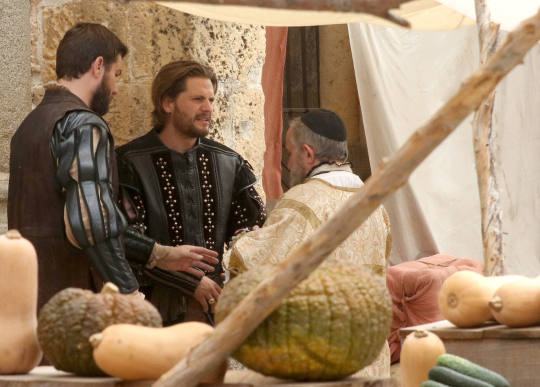
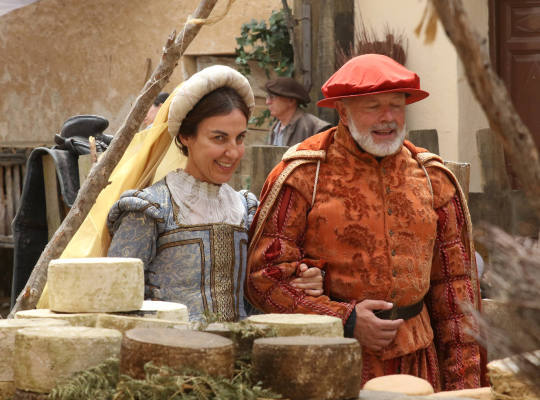




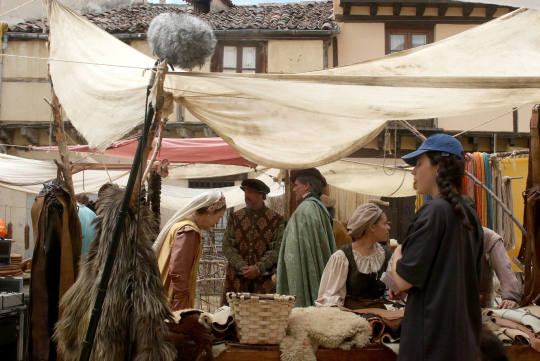
#beguinas#upcoming series#period dramas#amaia aberasturi#yon gonzález#beatriz segura#melani olivares#ella kweku#lucía caraballo#silma lópez#jonás berami#javier beltrán#jaime olías#meritxell calvo#laura galán#cristina plazas#elisabeth gelabert#ignacio montes#antonio durán#jorge kent#16th century#upcoming period dramas
13 notes
·
View notes
Text
yes, mr gabriel garcia marquez, I understand the symbolic significance of repeated names in the history of the buendía family, but was it really necessary to have tWENTY TWO CHARACTERS NAMED AURELIANO IN YOUR BOOK????
27 notes
·
View notes
Text
名作小説のあらすじをまとめた学生向けのオンライン学習ガイド「CliffsNotes(クリフスノーツ)」は、エッセイを書く補助になる質問がついてる。マルケス「百年の孤独」の場合:
- - - - - - - - - - - - - - - -
Study Help Essay Questions
Explain possible answers for the Buendías' limited capacity for love. ブエンディア家の愛が限定されていることについて、考えられる答えを説明せよ。 .
Contrast the concepts of solitude and solidarity through one generation of the Buendía family. ブエンディア家の一世代を通じて「孤独」と「連帯」の概念を対比せよ。 .
Comment on the stability of the Buendía women, when compared with the Buendía males. ブエンディア家の男性と比較した場合、ブエンディア家の女性の安定性についてコメントせよ。 .
What part does fantasy play within the novel? 小説の中でファンタジーはどのような役割を果たしているのか? .
Explain the Buendías' inordinate fear of punishment because of incest. ブエンディア家が近親相姦に対する罰を過度に恐れてることについて説明せよ。 .
Discuss the role of illegitimacy within the Buendía family and García Márquez' attitude towards South America. ブエンディア家における非嫡出子の役割と、ガルシア・マルケス���南米に対する態度について論じなさい。 .
How successfully is solitude used as a metaphor for the Buendías' "curse," and how successfully can it be applied to South America's historically lesser role in the politics of the Western world? 孤独がブエンディア家の「呪い」を表現するメタファーとしてどれほど成功しているか、またこのメタファーが南アメリカの西洋世界における歴史的な役割の小ささにどれほど適用できるかを評価せよ。 .
Why is this novel more successful as a "myth" than it would have been if it had been told in chronological order with actual dates and names and places? この小説が実際の日付や名前、場所を使って年代順に語られていた場合よりも「神話」として成功している理由は何か? .
- - - - - - - - - - - - - - - - CliffsNotesとは、学生向けに米国で生まれた、文学作品の学習ガイドみたいなもの。良い点は「Essay Questions」で質問が用意されてること、学生以外でも読後の考察に便利。この問いの立てかたが平易だけど上手。 - - - - - - - - - - - - - - - - Essay Questions | 100 Years of Solitude
Gabriel García Márquez
2 notes
·
View notes
Text
Cien años de soledad - Gabriel García Márquez
Cien años de soledad es una novela del escritor colombiano Gabriel García Márquez, ganador del Premio Nobel de Literatura en 1982. Es considerada una obra maestra de la literatura hispanoamericana y universal, así como una de las obras más traducidas y leídas en español. Fue catalogada como una de las obras más importantes de la lengua castellana durante el IV Congreso Internacional de la Lengua Española celebrado en Cartagena de Indias en marzo de 2007. Fue incluida en la lista de las 100 mejores novelas en español del siglo XX del periódico español El Mundo, en la lista de los 100 libros del siglo XX del diario francés Le Monde y en los 100 mejores libros de todos los tiempos del Club de libros de Noruega.
Lee más sobre esta novela en Wikipedia.
One Hundred Years of Solitude - Gabriel García Márquez
One Hundred Years of Solitude is a 1967 novel by Colombian author Gabriel García Márquez that tells the multi-generational story of the Buendía family, whose patriarch, José Arcadio Buendía, founded the fictitious town of Macondo. The novel is often cited as one of the supreme achievements in world literature. The magical realist style and thematic substance of One Hundred Years of Solitude established it as an important representative novel of the literary Latin American Boom of the 1960s and 1970s, which was stylistically influenced by Modernism (European and North American) and the Cuban Vanguardia (Avant-Garde) literary movement.
Read more abut this novel on Wikipedia.
19 notes
·
View notes
Text
Why "One Hundred Years of Solitude" Should Be Your Next Read
In the vast landscape of world literature, few novels have left an indelible mark on readers' hearts and minds like Gabriel García Márquez's "One Hundred Years of Solitude." Published in 1967, this timeless masterpiece is a cornerstone of the magical realism genre and continues to captivate readers across generations. But why should you invest your time in this classic? Let's explore the compelling reasons why "One Hundred Years of Solitude" is a must-read.

García Márquez's novel is a prime example of magical realism, a genre that seamlessly blends the ordinary with the extraordinary. Dive into the town of Macondo, where the story unfolds, and experience a world where the miraculous and the everyday coexist, creating a surreal and enchanting narrative. Discover how magical realism adds depth to the storytelling.
"One Hundred Years of Solitude" weaves a captivating multigenerational saga through the Buendía family's journey over seven generations. The novel's intricate family saga explores timeless themes such as love, ambition, power, and the cyclical nature of history. It offers a panoramic view of the human experience, making it a must-read for those seeking depth in their literature.
Set against the backdrop of Latin American history, the novel allows García Márquez to comment on complex political and social issues. Dive into his profound exploration of the impact of colonialism, imperialism, and the cyclical nature of history on the people of Macondo. Gain insights into universal themes like power, corruption, and the quest for identity.
"One Hundred Years of Solitude" introduces you to a diverse cast of unforgettable characters, each with their own quirks and idiosyncrasies. From the enigmatic José Arcadio Buendía to the mysterious Remedios the Beauty, you'll become emotionally invested in their stories. Discover how these characters become more than words on a page; they become friends you won't forget.
García Márquez's writing is a true work of art, characterized by poetic language, metaphor, and symbolism. The novel is rich in vivid descriptions and evocative imagery that immerse you in the magical world of Macondo. Savor each word as you read, knowing that you're not just reading a story but experiencing a literary masterpiece.
This novel delves into the complexities of the human psyche, exploring love, desire, and the intricacies of human relationships. It's a profound examination of the human condition that will prompt introspection and self-reflection as you read.
"One Hundred Years of Solitude" remains as relevant today as it was in 1967. Its timeless themes of love, power, and the passage of time continue to resonate with readers worldwide, making it a classic that's not to be missed.
In conclusion, "One Hundred Years of Solitude" is a literary masterpiece that offers an immersive and enchanting reading experience. It's a book that will transport you to a world of magic and reality, invite you into the lives of unforgettable characters, and make you ponder the deepest questions of the human experience. So, if you're searching for a novel that will leave a lasting impact and ignite your passion for literature, look no further than García Márquez's "One Hundred Years of Solitude." Immerse yourself in its pages and let the magic unfold before your eyes. Your next literary adventure awaits.
#one hundred years of solitude#Gabriel Garcia Marquez#magical realism#book recommendations#books#book lovers
6 notes
·
View notes